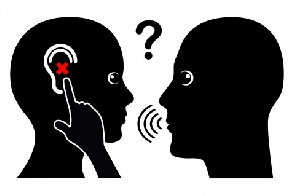Mr Juventus Duorinaah, the Project Officer of the Ghana National Association of the Deaf (GNAD), has said many speech and hearing impaired people in Ghana, experienced challenges in accessing justice.
He said a survey conducted by GNAD in the Upper East, Upper West and the Northern regions, revealed that 58.8 per cent of respondents who were deaf and dumb do not know they have rights because state institutions failed to provide appropriate support systems that will facilitate both access to justice and information for them.
Mr Duorinaah, who was speaking at an advocacy forum in Tamale, said 60.7 per cent of respondents claimed that GNAD did not have the means to pay for sign language interpreters to enable deaf people access justice while 55.9 per cent said there were inadequate skilled sign language interpreters who can adequately understand deaf language.
The forum was held on the theme: “Advocating for the Rights of Deaf Persons”.
He expressed the hope that the situation would improve if the necessary mechanisms are put in place and advised deaf and dumb persons not to lose confidence in the justice system by refusing to make attempts to seek justice if their rights were violated.
Mr James Sambian, Executive Director of GNAD, said poor communication between deaf and dumb, and non impaired people has gone a long way to impact negatively on education, healthcare, justice, employment, marriage and relationships.
He said according to the 2010 Population census, there were 110,625 deaf and dumb people in Ghana and stressed the need for formal training for Sign Language Interpreters (SLI).
He said GNAD has scheduled to partner with the University of Cape Coast to train 30 SLI this year.
Mr Sambian appealed to the Ghana Police Service to arrest and prosecute deaf people who beg for alms on the streets with GNAD branded envelopes to deter others from doing same.
Alhaji Razak Saani, the Northern Regional Director of the National Commission for Civic Education (NCCE), advised GNAD to advocate for complete infusion into the public sector, by putting them under the Department of Social Welfare.
He said the training of people on sign language should also be done at the local level to ensure that illiterate deaf people understood the sign language, which would also enable hearing people to have immediate access to training centres.
Mr Seidu Alhassan, a Deputy Chief Investigator at the Commission for Human Rights and Administrative Justice (CHRAJ), said in an interview with the Ghana News Agency that CHRAJ was mandated to serve all including the deaf and dumb.
He said abused people especially the deaf could report all cases to CHRAJ to address their issues by either coming to the office or use of fax or email.
Other stakeholders called on state institutions to discharge their legal mandate as spelt out in the various acts and advised the association to involve the Ghana Institute of Languages in the teaching of the sign language
Health News of Saturday, 24 June 2017
Source: GNA













